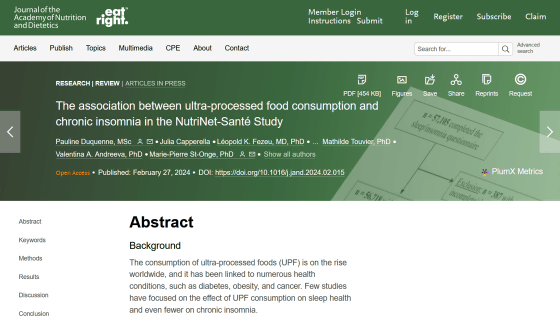Research results show that 'ultra-processed foods' such as cup noodles and snacks are related to insomnia

The association between ultra-processed food consumption and chronic insomnia in the NutriNet-Santé Study - Journal of the Academy of Nutrition and Dietetics
https://www.jandonline.org/article/S2212-2672(24)00094-7/fulltext

What's Keeping You Up at Night? Could Ultra-Processed Foods Be Associated With Your Insomnia?
https://www.elsevier.com/about/press-releases/whats-keeping-you-up-at-night-could-ultra-processed-foods-be-associated-with-your-insomnia
Chronic Insomnia Linked to Ultra-Processed Foods, Study Finds: ScienceAlert
https://www.sciencealert.com/chronic-insomnia-linked-to-ultra-processed-foods-study-finds
Ultra-processed foods such as instant noodles, snacks, carbonated drinks and frozen meals have become a part of people's daily lives, but research has linked the consumption of ultra-processed foods to health problems such as heart disease and diabetes, and some studies suggest they may also have a negative impact on learning and memory.
However, there have been few studies to date that have examined the effects of ultra-processed food intake on sleep. Therefore, a research team from the Sorbonne Paris Nord University in France and Columbia University in the United States analyzed data from a large-scale survey on sleep and diet to examine the relationship between ultra-processed food intake and insomnia.
'In an age where more and more foods are highly processed and sleep disorders are becoming more prevalent, it is important to evaluate whether diet has a negative impact on sleep or whether it promotes better quality sleep,' said Dr. Marie-Pierre St-Onge , corresponding author of the study and associate professor of nutritional medicine at Columbia University.

The researchers looked at data from 38,570 people collected as part of a French research project called
Analysis of the data showed that participants consumed an average of 16% of their daily energy from ultra-processed foods, 19.4% reported symptoms of chronic insomnia, and those who reported symptoms of chronic insomnia were more likely to consume high amounts of ultra-processed foods.
Specifically, it was reported that a 10% increase in ultra-processed food intake was associated with a 7% increase in the prevalence of chronic insomnia. It was also confirmed that the association between ultra-processed food intake and insomnia was slightly stronger in men than in women.

Lead author Pauline Duquenne from the Sorbonne Paris-Nord University said: 'It is important to note that our analysis is cross-sectional and observational and does not assess longitudinal associations. Although the data do not prove causation, this study is the first of its kind and contributes to existing knowledge about ultra-processed foods.'
Science Alert, a scientific media outlet, argued that previous studies have found a link between the Mediterranean diet and a reduced risk of insomnia, and that this study appears to show 'the other side of that relationship.'
Related Posts:







